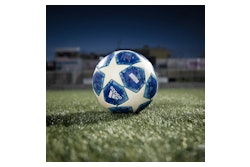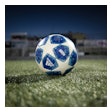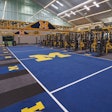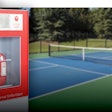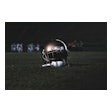Copyright 2014 Charleston Newspapers
Surprisingly, ESPN analyst and former NFL player Merril Hoge isn't opposed to youngsters playing football or any other contact sport.
"I've had so many parents come up to me about their son or daughter being concussed in diving,'' said Hoge, who saw his playing career cut short by concussions. "Who would think diving? Here's the bottom line, everything comes with some type of risk. I've coached youth football for 15 years and my son for seven.
"I lost more kids to practice and games due to recess and lunch than I ever did football. I'm getting ready to practice and where's Griff? He was out on the monkey bars, fell off and broke a wrist.' I had one kid who was concussed when they were playing kickball and somebody hit him in the head. It happens everywhere.''
Hoge, who played running back the Pittsburgh Steelers and Chicago Bears for eight seasons, was the keynote speaker for Tuesday evening's University of Charleston Speaker Series titled "Under review: The Future of Football and the NFL'' at Geary Auditorium. Hoge also held an autograph session prior to the lecture in the rotunda at Riggleman Hall.
Fellow ESPN analyst Mark Schlereth, a three-time Super Bowl champion offensive lineman with the Washington Redskins and Denver Broncos, was scheduled to join Hoge but his plane was delayed because of the snowy conditions in Charleston and couldn't make the event.
Concussions were at the forefront of the topics Hoge covered with local media after the autograph session. Head trauma has been front and center since retired NFL players won a $765 million lawsuit against the league. In the wake of the lawsuit, the NFL also adopted more stringent protocols in allowing players to return to game action.
Hoge was forced into retirement because of concussions in 1994. During a road game against he Kansas City Chiefs, he received a concussion and, five days later, the team doctor approved him to resume playing during a telephone call without examining him to determine if he had recovered.
Hoge sustained another concussion several weeks later, and had to be resuscitated after he stopped breathing. He spent 48 hours in the intensive-care unit and was forced to retire due to brain injury or face permanent damage. Hoge had to learn to read again and experienced memory loss, confusion and headaches. He later sued the Bears team doctor and won a $1.55 million judgment.
Hoge said he feels his mission now is to educate parents at events such as the one UC sponsored. Hoge was among the first groups of players in the NFL that received cognitive testing before returning to a game after a concussion.
"So do I want to spend the rest of my life and energy throwing mud at something I can't change, or based on all the things we have changed and learned can we educate and help to where we create a safer environment?'' he said.
"That is my objective now. To be bitter and angry, I get nothing out of that. To do this we'll get a lot of people who will hopefully leave much more education and much more empowered. Now I know how to challenge and ask my coaches are they doing this and be safer about it.
"And now I'll put the helmet on him when he rides a bike now. I just learned that, too. I've let him slide on the seatbelt and I'll put that on him, too. That's my objective now. We can make a lot of changes and improve in a lot of areas if we spend our energies doing that instead of me sitting there waxing and crying about what happened to me.''
Hoge said concussions were way down on the list of injuries during his career and that a better awareness is why head trauma seems to be on the rise.
"If you think about head trauma and 15 years of [playing football] it would be the last one on the list as far as all that I've had from bumps and bruises to a broken finger to a broken rib, bruised thigh, hurt shoulder, those exceeded way above,'' he said.
"[The brain] is your most valuable organ so you need to treat it as such. When it does happen you need to do the right thing. What we're implementing now in youth sports the second it happens. This sport has become a lot safer than it was five years ago
"There's standards now that coaches have to live by today. All these implementations have taken place to create a safer environment for football and we're hoping it spreads to all sporting events.''
Hoge said when he coached his son's youth football team he rarely saw concussions.
"In seven years coaching just my son's team we had two incidents where I had to remove a kid from a game, and he played the following week,'' he said. "In both kids' cases it was the parent who said he could play earlier than I would let him play.
"I established how we're going to handle head trauma. As long as you have people who are teaching the game correctly, applying the right standards for head trauma and the right care, you've just created a much safer environment.
"Does that mean your son or daughter isn't going to have head trauma? No. The risk of putting them in there when they're not ready? Much safer now than it's ever been as long as [the coaches are] certified. As far as having long-term effects from it? Very minor because as long as you're doing the right standard and getting the right evaluations if it were to happen again the medical practicioner would be here's one environment we need to eliminate. They give you that guidance before it gets too late.''
Hoge said sports provide lessons that are too valuable to have kids sitting on the sidelines because parents are worried about head injuries.
"I don't let them ride a bike, I don't let them roller blade, I don't let them do football or play soccer,'' said Hoge of some parents' mindsets. "That's a parental choice. Now have you neutralized the growth and development of a kid when you do that stuff? Yeah.
"Imagine taking all sports away. Eliminate them. Wipe them off the map. Think how significant that is for the growth and development and life lessons of our kids. It's not just playing sports but the overall growth and development of them, too.''
chris dorst | Gazette
Former NFL player and current ESPN analyst Merril Hoge flips an autographed football to Matt Thomas of Charleston during an autograph session prior to his speech Tuesday night at the University of Charleston.
Reach Tommy R. Atkinson at [email protected] or 304-348-4811.
Terms and Conditions Privacy Policy













